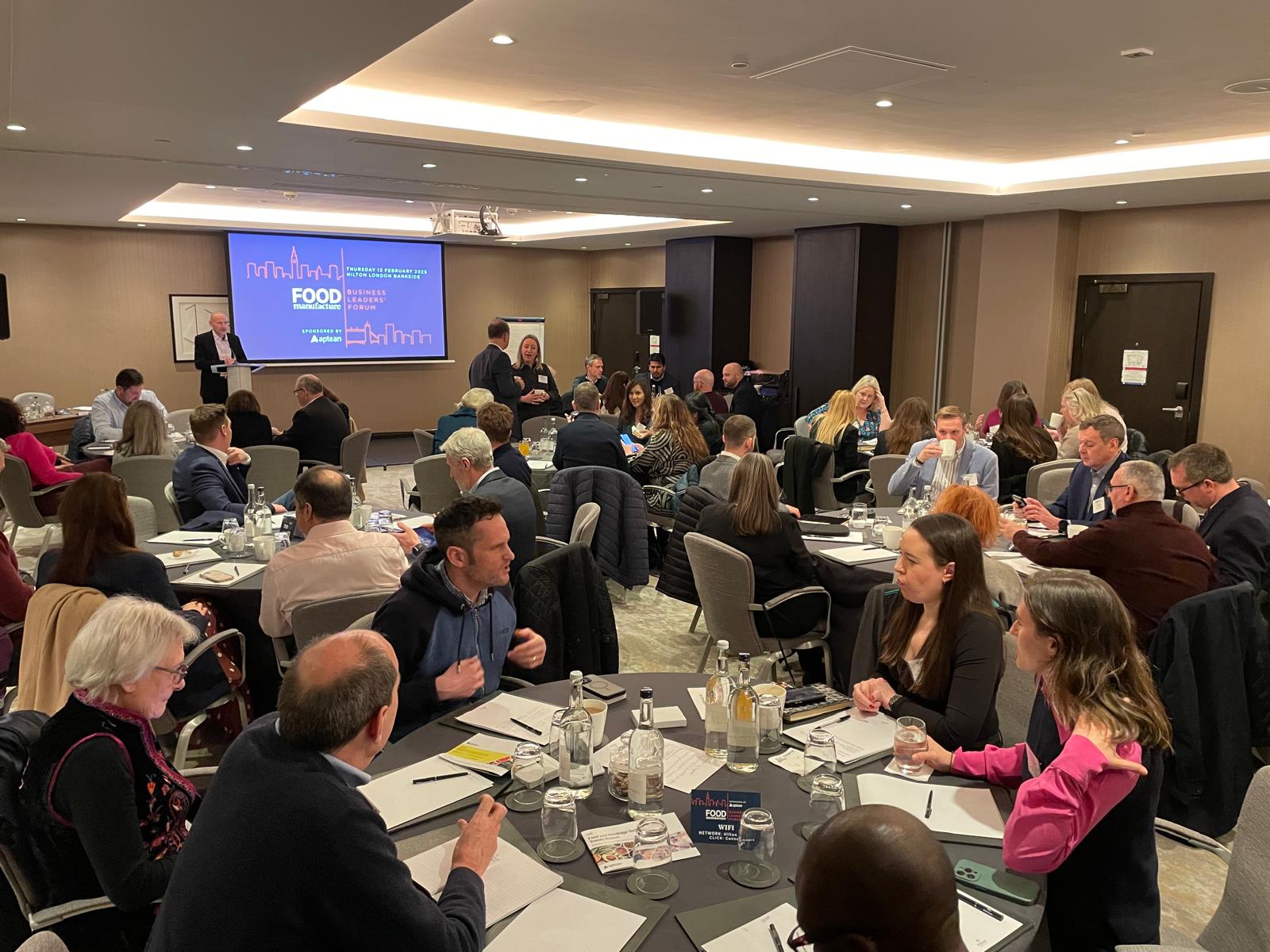Held at Hilton London Bankside on 13 February, Food Manufacture’s Business Leaders Forum, sponsored by Aptean, attracted a range of senior figures from across the food and drink sector. Held under Chatham House rules, there were plenty of perspectives on offer, but concerns about finding qualified and motivated staff were evident.
Kicking off the discussion, an attendee reflected on the shift towards working from home in many sectors. They argued that because this is less of a possibility within the food and drink manufacturing sector, after all you can’t very well operate a line from your sofa, it is potentially putting firms at a disadvantage while advertising open roles.
The next speaker agreed with this perspective, sharing their own struggles with finding staff to work on the production line in their business.
“We are National Living Wage employer based in London, but the level and quality of applications we receive now are far poorer than in the past,” they told the forum.
“This has certainly accelerated since Brexit with a lot of EU migrants having left the UK in recent years. We have lost a conveyor belt of talented and committed workers, who now feel they are better off elsewhere.”
They also touched on Covid as a factor, arguing that this led to more people than before falling out of education, employment and training.
“More than one million people in the UK are now NEETs (Not in Education, Employment, or Training), but we are failing to attract them to the food industry,” another attendee said in response to this point.
“Meanwhile, food education is so lacking in schools, so they don’t see it is an option.”
This notion was widely agreed in the room, with several people discussing their difficulties in appealing to younger people in particular.
“We need to appeal to young people directly and show them the opportunities attached to a job in the food sector,” said one attendee.
“The pay is good compared to jobs with similar academic requirements and this is shown by retention being less of an issue. The main challenge is getting people through the door.”
Aside from pay, approaches such as transitioning to an employee-owned trust (EOT) setup have allowed certain firms to attract staff more readily.
“When working for an EOT people are more compelled to work hard and participate actively because they have some ownership over the process,” another suggested.
“This incentive can be really powerful and is a great carrot to use during the recruitment process. It helps us stand out against the competition.”
Apprenticeship changes
Fittingly, this discussion took place during National Apprenticeship Week, an annual event that has been designed to advertise the benefits of apprenticeship programmes for both workers and employers. With that in mind, one attendee cited the Apprenticeship Levy as having had a positive impact on recruitment.
“We are seeing more young people utilising apprenticeships than 10 years ago and this really positive for the food sector,” they explained.
“With some of the new policies that are being introduced, they can play an important role in solving some of the recruitment challenges the industry faces.”
One such policy announced this month involves changes to the English and maths requirements for someone applying for an apprenticeship. From now on, applicants over the age of 19 will no longer need a Level 2 qualification in English and maths, although funding will be available for training programmes should they or their employee believe it is necessary.
“The relaxing of the functional skills requirement means that more people can go into apprenticeships and will not be disqualified based on their attainment at school,” one attendee argued.
“This increases the pool of potential applicants, many of whom have plenty to offer.”
Another change involves the introduction of shorter apprenticeships from August 2025, with the UK Government reducing the minimum duration of an apprenticeship to eight months. Like the relaxation of academic requirements, this has been designed to open up the possibility of an apprenticeship to more young people.
“The Apprenticeship Levy has been a massive help for larger employers, but I think these new changes can help SMEs,” another attendee chipped in.
“We know that hiring is difficult, so it is positive to see new measures that are trying to help us overcome these challenges. Apprenticeships often lead to full-time work and staff that have a sense of loyalty and buy-in.”
The role of AI
With recruitment a challenge, many firms have looked to automation and AI as ways of reducing reliance on labour. While automation has been around for years and often requires significant investment, the uses of AI discussed were more novel and, in many cases, cheaper.
For example, one firm had started using ChatGPT to analyse prices across its full range of products and suggest where changes would have least impact on sales. They admitted that the results were not perfect, but said the analysis was far quicker and easier to conduct and provided some valuable insights.
“Using these sorts of tools allowed us to save massively on man hours,” said the attendee.
“It also allows me to spend less time on these decisions on more time managing the team.”
Another attendee who agreed AI has been very useful, added jovially yet truthfully: “[They] don’t need a break or wages and never go to the toilet.
“We are still finessing the system and making it work seamlessly alongside our existing staff team, but it has given us some fascinating insights that we would not have had access to otherwise.”
After the session, Food Manufacture spoke to George Taylor, the founder of ready-to-eat meal delivery service Frive. As the firm has grown, Taylor has embraced machine learning in order to optimise operations and drive down labour costs, and the results have been impressive.
“At Frive, we’ve built a bespoke ERP system that forms the backbone of our operations, seamlessly managing everything from forecasting to fulfilment across our fully owned supply chain,” he explained.
“This system enables us to manufacture with a high level of granularity while leveraging machine learning and AI to optimise processes, identify and eliminate inefficiencies, and reduce administrative burdens.”
The system at Frive analyses 10,000 data points per day, something that cannot be processed by a human, which in turn allows the firm to create a far more personalised experience for its customers based on their tastes and ordering patterns
“[The result has been] significant cost savings that we reinvest into sourcing higher-quality produce – allowing us to continue our journey of becoming 100% organic without increasing pricing for our customers," Taylor concluded.





